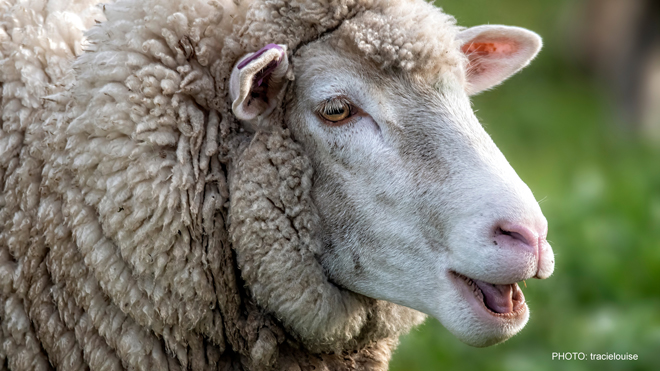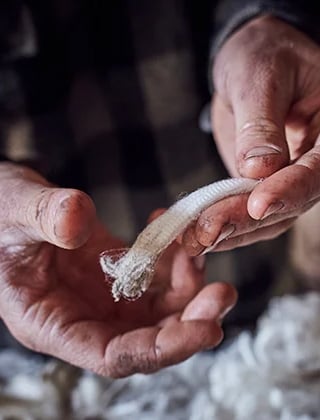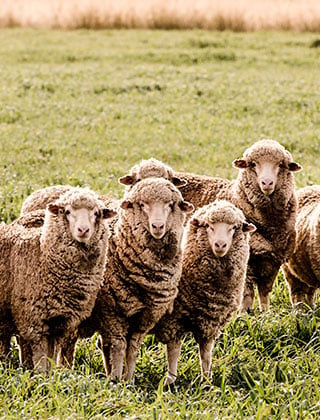Investment in methane-reducing supplements

The Australian sheep and wool industry has received another boost in its strategy to reduce the on-farm production of greenhouse gas emissions, with the Australian Government announcing extra funding for research into feed supplements to reduce the amount of methane that grazing sheep belch.
AWI’s significant investment to reduce methane emissions from grazing sheep received another boost in August when the Australian Government announced funding for four new projects under Stage 3.2 of its Methane Emissions Reduction in Livestock (MERiL) Program.
The new MERiL grant provides a further $3 million from the Australian Government for the projects’ partners to investigate the efficacy and delivery of combinations of sheep feed additives to improve methane abatement as well as productivity.
The new stage, which will run for 2.5 years, addresses two key aspects: feed additive combinations and delivery methods. These four projects build on five other AWI and Australian Government co-funded projects under the MERiL program (see below).
“This work sits within the National Sheep Methane Program (NSMP) which is a collaborative and coordinated effort between AWI and the departments of primary industries and universities in the main wool producing states, to implement practical and safe ways for producers to reduce methane emissions from Australian sheep grazing systems,” said AWI’s Program Manager, Fibre Advocacy & Eco Credentials, Angus Ireland.
“Throughout our engagement in the NSMP, every MERiL project funded by AWI has been supported and co-funded by the Australian Government, providing good leveraging of woolgrower funding. Every $1 invested by AWI in this latest stage is matched by $6 from the Australian Government, together with further funding and in-kind services from the project partners.”
The first goal of the new funding, additive combinations, will be the focus of the University of Western Australia (UWA) and University of New England (UNE). They will assess combining different classes of feed additives and ingredients, such as the rumen modifier Agolin Ruminant, to reduce methane emissions from grazing sheep and also increase productivity.
The second goal, delivery methods to grazing sheep, will be the focus of the Department of Primary Industries and Regions South Australia (PIRSA) and NSW Department of Primary Industries and Regional Development (DPIRD). PIRSA will examine the supply via drinking water and loose licks of antimethanogenic additives and previously untested combinations. NSW DPIRD will focus on identifying more effective intake of feed additives across the flock such as the effects of changing the mob size per feeder, the number of feeders in a paddock and the response to different additives.
“AWI is committed to helping reduce the wool industry’s environmental impact across the whole supply chain, with the farming stage being a key focus for reducing greenhouse gas emissions,” Angus said.
“For every dollar invested by AWI in these four new projects, the Australian Government will provide six dollars and our partners will provide further funding and in-kind-services, which is a good leverage of woolgrower funding.”
Angus Ireland, AWI Program Manager, Fibre Advocacy & Eco Credentials
Previous MERiL funding
This new funding is in addition to these five projects that are already receiving funding from the Federal Government under the MERiL program.
Project under Stage 3 of the MERiL program (announced in March 2023):
- To assess methane emissions at the flock and individual level under grazing of the three major methane-reducing additives to sheep at different feeding rates and meal frequency – Asparagopsis, Bovaer and Agolin (in collaboration with UNE, PIRSA, UWA and Feedworks).
Projects under Stage 2 of the MERiL program (announced in October 2022):
- To fast track the development of new technology solutions for delivering low emission supplements to grazing sheep at large-scale as a feed additive or via drinking water (in collaboration with PIRSA, UWA, Rumin8 and Feedworks).
- To evaluate the feasibility of using Radio Frequency Identification technologies to improve methane-reduction supplement design and delivery in conjunction with common delivery systems such as lick feeders (in collaboration with the NSW DPIRD).
- To develop a novel paddock solution to deliver methane-reducing supplements to grazing sheep (in collaboration with UNE and Feedworks).
Project under Stage 1 of the MERiL program (announced in February 2022):
- To undertake grazing and pen studies in northern NSW to quantify the relationship between the intake of the red algae Asparagopsis and the daily methane produced by grazing sheep, plus any associated wool and live weight changes in the sheep (in collaboration with UNE and Sea Forest).
This article appeared in the September 2024 edition of AWI’s Beyond the Bale magazine. Reproduction of the article is encouraged.















